Last Updated on January 4, 2022 by Guest Blogger
Disclaimers: Our site uses demographic data, email opt-ins, display advertising, and affiliate links. Please check out our Terms and Conditions for more information. Listed prices and attraction details may have changed since our visit and initial publication.
For many, attending Dia de los Muertos in Mexico (Day of the Dead) is a bucket list experience. Though it's called "Day" of the Dead, it's actually a two-day holiday; though some cities and towns begin setting up about a week in advance of the actual November 1 and 2 holiday.
While Day of the Dead is known the world over as the quintessential Mexican holiday, not every town has an elaborate celebration. In fact, in many places in Mexico, you'd not even know the holiday was taking place.
If you want to attend Dia de los Muertos in Mexico to see the beautiful cemeteries covered in marigold flowers, altars in dedication to the deceased, and more - you need to know where to go. Below you'll find information on the best places to celebrate Day of the Dead in Mexico, and some history on the holiday itself.
Dia de los Muertos in Oaxaca
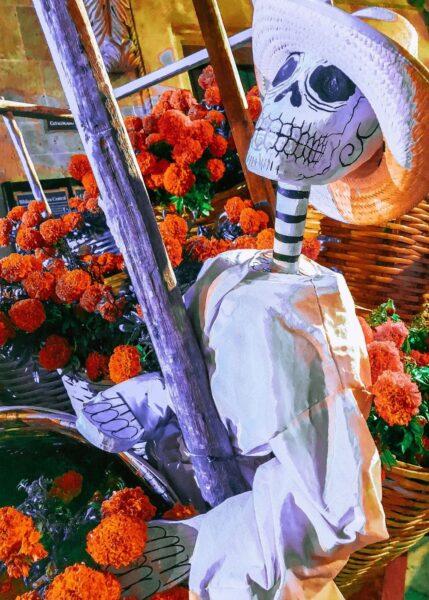
The biggest and best celebration of Dia de los Muertos in Mexico is the Oaxaca Day of the Dead festival.
There are several places to enjoy the celebration, including the state's capital of Oaxaca City, which has the most elaborate fiesta! You can also check out the festivities in San Agustin Etla and Xoxocotlan, two smaller Oaxaca pueblos.
For travelers seeking a true Mexican cultural experience, Day of the Dead in Oaxaca offers some great ways to do that. It does require planning if you want to go to Oaxaca City for Day of the Dead.
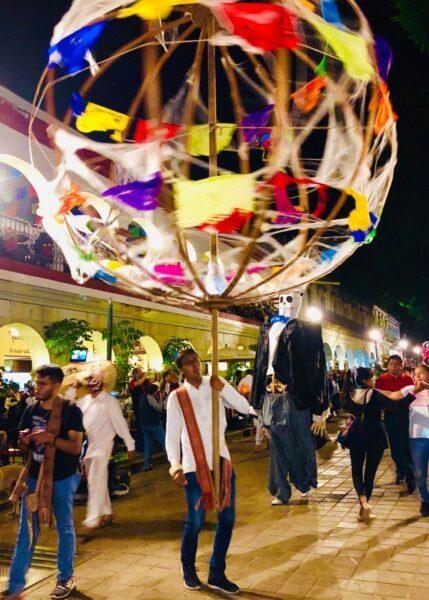
As a large, city-wide celebration, the whole town starts setting up in advance of the actual holiday on November 1 and 2. If you can, arrive by October 29, so you see all the prep work that goes into making Day of the Dead happen - as it literally envelops Downtown Oaxaca City.
A smaller town with limited accommodations, Oaxaca City hotels, Airbnbs, hostels, etc., are usually full by early-September. For those completely set on going, have your lodging booked by mid-August to ensure you have a nice place in Centro Historico (Downtown), where the celebrations take place.
One final thing to note is that this is a very loud, festive holiday! From about October 28 to November 4, expect comparsas (parades) with bands marching through the streets playing music during the day and night. You'll have a great time, but bring earplugs so you can also get some sleep.
Dia de los Muertos in Yucatan
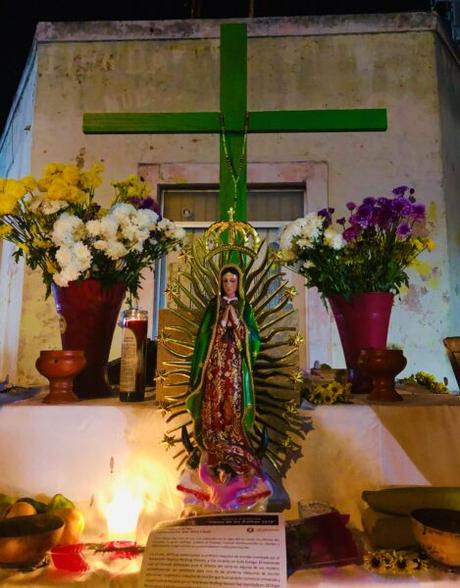
The Mayan Day of the Dead celebration is actually called Hanal Pixan (ha-naal pick-shawn), not Dia de Muertos. Though Hanal Pixan and Dia de los Muertos have a lot of overlap, there are things you can experience at Yucatan Peninsula celebrations you won't have in other parts of Mexico.
In the city of Merida, the Cultural Capital of Yucatan, you can participate in the Paseo de las Animas (Parade of the Souls). There are also altars set up throughout Downtown Merida, in remembrance of the deceased.
During this time of year, you'll also find pib, a type of Yucatan food tamale only made during Hanal Pixan. Pib is a crispy Yucatecan tamal that's cooked in an underground oven, also called a pib, which locals look forward to eating all year-long.
Dia de los Muertos in Mexico City
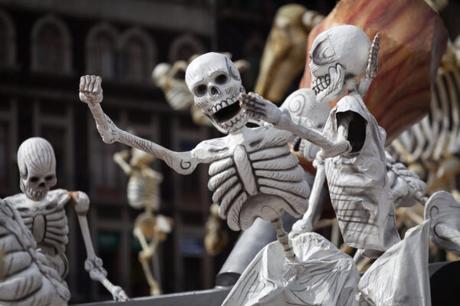
The Mexico City Day of the Dead parade is the easiest way to enjoy the holiday in Mexico. It's easy to get to Mexico City with direct flights from all over the world, and there's no way the city will sell out of hotels - so you can even attend this celebration on a last-minute trip.
The Saturday prior to the actual Day of the Dead holiday, many streets in the city shut down for a parade that goes on for miles. In it, you'll see floats, marching bands, and people dressed in elaborate costumes with painted faces doing dances, breathing fire and more.
The Day of the Dead parade in Mexico City, while a fun spectacle, is really more of a party and less of a cultural event. In fact, there wasn't anything official that took place in Mexico City for Day of the Dead at all until the James Bond film, Spectre, came out in 2015.
The parade in Spectre looked so cool that in 2016 thousands showed up for it. One problem: It didn't actually exist! The following year in 2017, Mexico City created the same elaborate parade as the one in Spectre - and the big Day of the Dead parade in Mexico City was born.
Other Dia de los Muertos in Mexico Celebrations

Located not far from Mexico City, if you want to experience more of a cultural Day of the Dead celebration, head to Mixquic. Another off-the-beaten path and very elaborate celebration takes place on Janitzio Island, one of the small towns of Lake Patzcuaro in the state of Michoacan.
The colorful colonial cities of Guanajuato and San Miguel de Allende, both located in Central Mexico's Guanajuato State, have celebrations as well. These make great destinations on their own, as two of the most beautiful colonial cities in Mexico, but are even much more fun during Dia de los Muertos in Mexico.
What is Dia de los Muertos?
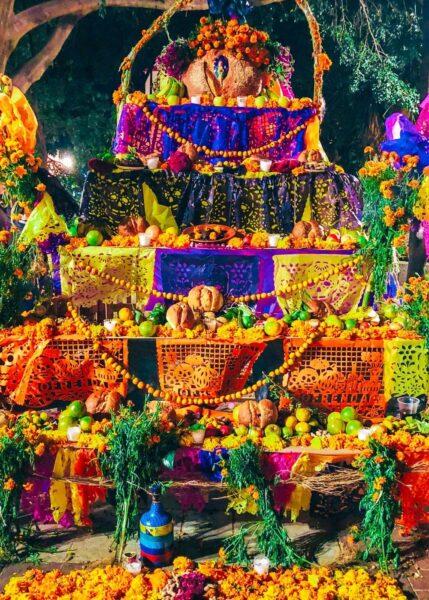
Wondering what exactly is the Day of the Dead holiday all about? While it's easy to oversimplify it as "Mexican Halloween," the holiday is much more than that. In fact, calling it Mexican Halloween would be culturally insensitive and tone-deaf.
During Dia de los Muertos, many believe the veil to the spirit world thins enough for our departed loved ones to cross through it and return to Earth to be with us. Though a time of deep remembrance, it's also a time to party, celebrate and remember them fondly for one day each year.
It is a multi-day holiday, held on November 1 and 2 each year. Since the celebrations start at midnight on November 1, many will say the holiday starts on October 31. The two days of the holiday honor both the children and the adults who have passed, each on a different day.
November 1 at midnight, the spirits of the children return to Earth. This day is sometimes called the Dia de los Inocentes (Day of the Inocentes), or Dia de los Angelitos (Day of the Little Angels). On November 2 at midnight, the spirits of the adults return.
Regardless of age, families will have photos of their deceased loved ones displayed on an ofrenda, or altar. For many, they appreciate it when you ask questions about them. You'll also see marigold flowers, sugar skull candies, and the person's favorite food and drinks on the altar as well.
Images were provided courtesy of Travel Mexico Solo and via stock photography.